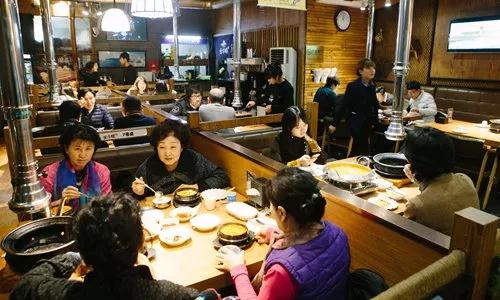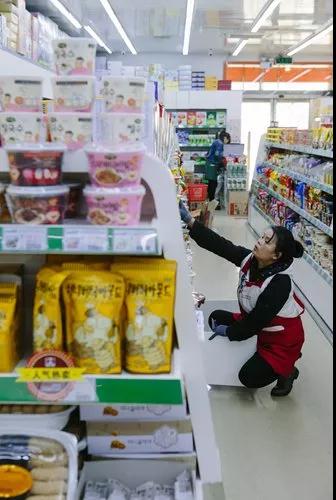
Restaurants in Wangjing, Beijing that serve Korean food see business growing after experiencing a low point caused by the THAAD issue. (Photo: Li Hao/GT)
It is a chilly Beijing morning in November, even with the sun shining brightly outside. The business in Jack Hong's store in the Wangjing area of Beijing is just like the weather - cold, yet still hopeful.
Running a Korean supermarket near Beijing's Korea Town for more than 10 years, Hong feels he can finally catch his breath after one of his hardest periods in business. Affected by the standoff of Terminal High Altitude Area Defense (THAAD), his business kept declining for months and only recently stabilized and started to grow slightly as the bilateral relations begin to warm up.
"The worst time was between March and April when everyone was protesting against THAAD. Things are now getting slightly better, but I can hardly feel real recovery in trade," said Hong, who still has faith for his business in the future.
Trade and retail between China and South Korea witnessed a dramatic drop since February as the latter decided to deploy the THAAD system, which received strong protest from China.
Big South Korean companies such as Lotte have witnessed huge losses as they lose their Chinese market and Chinese customers are voluntarily boycotting South Korean products.
However, as the bilateral ties begin to mend and South Korean President Moon Jae-in is expected to visit China next month, a sense of a warming up in trade and retail can be felt in both Beijing and Seoul.

A saleswoman works in a supermarket mainly selling South Korean products in Wangjing. (Photo: Li Hao/GT)
No more Korea Town
"The influence of THAAD is huge. Our monthly turnover dropped by 30 to 40 percent after February," said Hong. Business has stopped declining only recently, but it is hard to get back to the way things were before, he said.
Wangjing, located in the northeast of Beijing, has the largest concentration of South Koreans in the city, and Korea Town was one of its most well-known landmarks. Walking on the street, it was like being in South Korea. Most of the signs are marked in both Korean and Chinese, bilingual services are provided in the stores and Korean restaurants are dotted everywhere. However, things began to change.
"Now, there are fewer and fewer Koreans in the area, and most of our customers are Chinese," Hong said, adding that there were around 70,000 to 80,000 Koreans in the area, and now the number has dropped to between 10,000 and 20,000, which was not only a result of the THAAD issues but also increasing living expenses such as high rent.
"Koreans living in other areas will come to Wangjing for shopping and entertainment on the weekends, but still, the number of them has declined, especially after the THAAD issue," Hong said.
Facing the economic pressure, the supermarket has laid off 50 percent of their employees in an effort to make ends meet to get through the current cold season for business.
"I hope Moon Jae-in's visit can bring some real solutions to the issue and improve the bilateral relations so that our business can return," Hong said.
Hong's wish echoes with many others that are doing business in the area, and Xue Dongmei, the manager of four Korean restaurants in Wangjing, is one of them.
"I still remember the scene in May when the whole building was almost empty. There were no customers at all, Koreans or Chinese. It was frustrating," said Xue when recalling the hardships they have been through this year.
The business began to recover in September and the growth is about 20 to 30 percent compared with its lowest point. But still, a full recovery is yet to come.
"Now we have tourist groups from South Korea coming for dinner every week, and I believe things will get better as the bilateral ties are being mended," Xue said.
However, it does not mean that disputes and tension over the THAAD issue are over. It appears that South Koreans living in Beijing can hardly feel a warming-up between the two countries.
"Taxi drivers still keep asking me about my personal views on the issue, which makes me upset. I don't think the problem is settled yet," said a South Korean surnamed Ko, who has worked in Beijing for years.
Ko's thought can be easily proved by looking at a street sign. The Chinese characters han guo (South Korea) on the Korea Town sign were pulled off and replaced by Wangjing in March amid anger and frustration over the THAAD issue.
According to Ho, he expects real recovery of the bilateral ties, and the sooner, the better.
Seoul: hard transition but obvious recovery
Compared with Beijing, the recovery in Seoul is a bit more obvious. Growing numbers of Chinese customers can be seen in the Myeongdong shopping area, one of the most visited places by tourists.
According to employees that the Metropolitan spoke with who worked in shops selling skin care products, recovery of business can be strongly felt, with an essential growth of turnover compared with the lowest selling point in March.
Some say their overall sales can reach 80 percent of the average sales levels from last year, whereas others say there are still much fewer customers from the Chinese mainland than before.
"The THAAD issue has greatly influenced our business since most of our overseas distributors and wholesalers are Chinese, and we have been doing business with China since 2012," said an anonymous Korean businessman who runs several skin care product stores, travel agencies in Seoul and online shops on Taobao.com.
Although he has customers from Vietnam and Thailand, Chinese remain the main customer body. His business fell by 50 percent and he closed two shops and laid off many employees in March.
"The recovery mainly comes from shopping by Chinese tourists, but we still have difficulties cooperating with Chinese distributors," he said, who is now targeting customers from Japan and Southeast Asia.
However, the strategic transition is not easy to make since he needs to rebuild business partnerships and develop the market from scratch.
The same transition strategy can also be found in the industry of cosmetic and plastic surgery.
"We now put our focus in the Thai market and only leave micro-plastic surgery businesses in China since the country has a very high standard for overseas medicines and the THAAD issue has made it even harder for us to get into the Chinese market," said a Korean industry professional who refuses to reveal his real identity.
However, the transition plan is not settled yet, with many saying they are still waiting to see what will happen after Moon Jae-in's visit to China.
"We are very concerned about his visit and hope for a better result for the two countries," the anonymous South Korean businessman said, adding that they also keep a close eye on Lotte's selling performance in China, which is a signal for the business environment.
Experts: "Easy to break, hard to recovery"
Meanwhile, experts hold a more cautious attitude toward the recent warm-up between the two countries.
"Recovery and warmth are a big trend, but the shadow of THAAD is still there," said Zheng Jiyong, director of the Center for Korean Studies at Fudan University. He said it has damaged the public's feelings in both countries, which can be reflected in trade and retail. However, recovery can be seen much more obviously in South Korea than in China since the latter has a much bigger market and customer body.
"It proves that South Korea has a much bigger economic reliance on China than China does on South Korea," Zheng said.
However, a full recovery cannot be made without a good and thorough solution to the THAAD problem. Song Dexing, researcher of Asia-Pacific Development Research Center of Nanjing University, echoes Zheng's opinion.
"In the field of trade and business, there is a certain dissymmetry between China and South Korea. Chinese merchants have a much wider range of choices in terms of business partners than Koreans, so the latter are more eager for progress and improvement," said Song. He stressed that a healthy and stable bilateral relationship is a common wish for the two peoples.
"THAAD has generated serious damage on China's national safety, which is far beyond trade and business," Song said. He indicated that without strong backup from China, South Korea would be confined to the US and even to Japan and North Korea, therefore THAAD is not only damaging China-South Korea ties but also puts South Korea in a disadvantaged position internationally.
"China's attitude and stand toward THAAD won't change, but it will push for strategic consultations and cooperation on the basis of periodical solutions," Song said.
"It's easy to break and damage, but hard to recover," said Zheng, "so we need to cherish everything we have now."
Hui Yiming contributes to the story in Seoul


